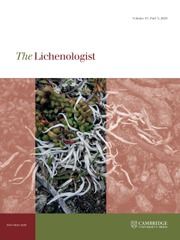Article contents
Lichen Colonization and Recolonization of Two Recently Deglaciated Zones in the Maritime Antarctic
Published online by Cambridge University Press: 28 March 2007
Abstract
The stages of vegetation development close to two glacier fronts on two of the South Shetland Islands (Livingston and Robert) within the Maritime Antarctic were studied with special reference to saxicolous lichens. A lichenometric study of the crustose lichen Caloplaca sublobulata was carried out at both sites. On the moraine of Livingston Island, rock size played an important role in lichen development, explaining most of the differences observed in the diameter of C. sublobulata, the number of species, and the percentage of cover among the rocks studied. On Robert Island, the distance from the glacier front was associated with the lichen cover of the rocks but not with diameter of C. sublobulata This homogeneous distribution of C. sublobulata thallus size on the Robert Island study area points to a simultaneous recolonization of the whole zone by this lichen. The lichen development in the area studied on Robert Island seems to have been drastically affected by fluctuations in the persistence of snow cover following glacier front retreat. Tentative associations between ice retreat and colonization, on the o e hand, and changes in snow cover duration and the dynamic processes of extinction and recolonization, on the other, are suggested from comparison of the two zones.
- Type
- Research Article
- Information
- Copyright
- Copyright © British Lichen Society 1995
- 2
- Cited by




